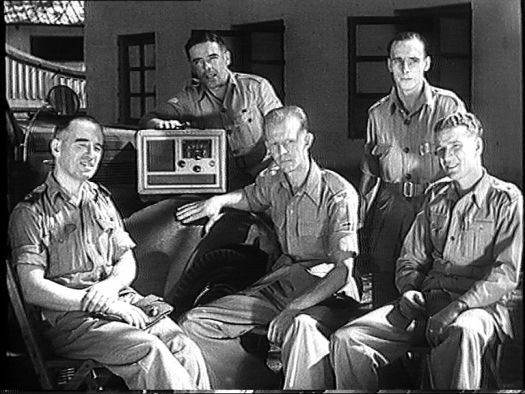Film Archive teams up for Blighty documentary
6 October 2015
Channel 4 commission programme on "Calling Blighty" films
THE North West Film Archive is working with national broadcaster Channel 4 on a documentary about the poignant “Calling Blighty” films.
The World War II footage reveals frontline British soldiers recording video messages to their loved ones back home.
The footage, shot in a style remarkably similar to a modern day Skype call, gave each solider around 30 seconds to share a personal message. These heart-warming films offer a glimpse into the lives of these courageous servicemen as they endured long periods of separation from their homes while serving in the Far East.
Help needed
Unlike the instantaneous video messaging we have today, it took up to three months for these filmed messages to get back to Blighty. The soldiers’ families were invited to local cinemas screenings to enjoy a glimpse of their relatives - some of whom had tragically died by the time the films reached home.
Now, more than 70 years after the footage were recorded, Channel 4 and the North West Film Archive would like the public’s help in tracking down these World War II veterans and their families, for a documentary to broadcast in early 2016.
The public can now access an easy to search online archive of filmed messages of over 600 servicemen from across the North West of England - along with their names, ranks, regiments, serial numbers, and the place they came from.
Boosting morale
Between 1944 and 1946 the Directorate of Army Welfare in India recorded as series of short films called “Calling Blighty”.
British troops who were stationed in India, Burma and Sri Lanka, fighting on the relentless Burmese Campaign against the Japanese, regarded themselves as The Forgotten Army. Home leave wasn’t possible, post was slow, and sometimes letters didn’t get home at all. Some left behind pregnant wives, elderly parents who would pass away before they returned or young children who would barely recognise them by the time they came home.
Morale was low, so in an attempt to prevent mutiny from spreading amongst disaffected troops, the Ministry of Defence decided upon a scheme to provide a much needed boost for the soldiers in the Far East and their families back home.
That scheme was “Calling Blighty”. The films - a series of personal messages home to loved ones - were sent back, and families were invited to cinema screenings to catch a glimpse of their relatives on screen.
Rusting cannisters
The films were discovered in rusting film canisters in the basement of Manchester Town Hall during a refurbishment of the building. The 25 reels feature over 600 servicemen from across the North West of England, with all of their paper work intact – recording their names, ranks, regiments and serial numbers. The paperwork also recorded the names and addresses of their nearest and dearest back home – so the caller could reach their callee.
The Archive’s Service Manager Marion Hewitt said: “This is a project I have been hoping to do for many years, and now with funding from Film Hub North West Central, and support from Manchester School of Art and HOME, we can finally achieve this long held aim.”
Manchester School of Art’s Professor Steve Hawley, who will be making a film featuring some of the most interesting stories, said “These few remaining films are a unique picture of 600 young Manchester servicemen (and two women) in the Far East around VJ day. As a research resource this is priceless, and as a human document the spirit and humour of the soldiers shines through in a very moving way.”
Working title
“Calling Blighty” (working title) will air in early 2016 on Channel 4. The film is produced by Oxford Scientific Films.
The North West Film Archive is part of Manchester Metropolitan University (Library Service Special Collections) and is the publicly recognised home for moving images about life in the North West of England.



